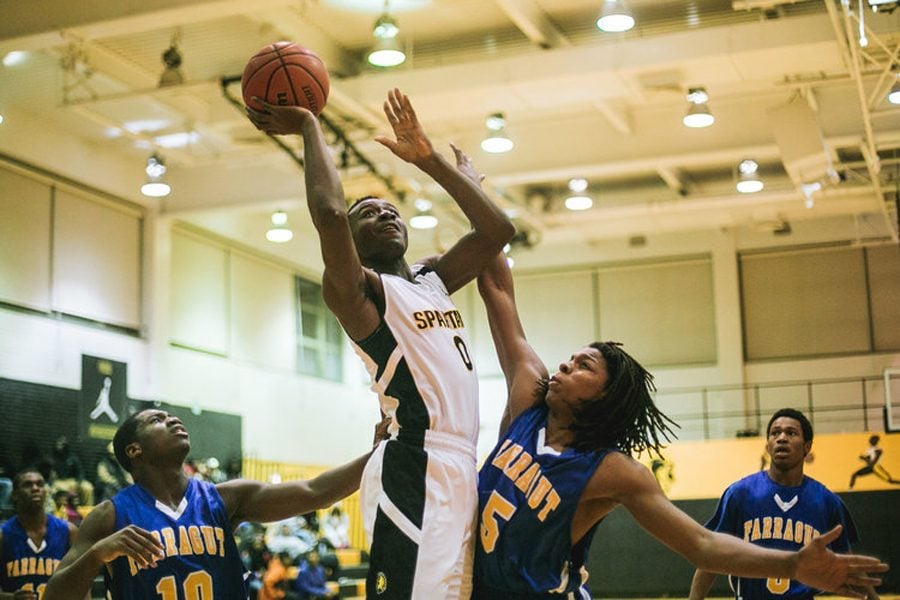Cast, crew of Chicago-based Fox Sports documentary ‘Shot in the Dark’ talk filmmaking process
An Orr Academy Spartan takes a shot. The cast and crew discussed the film at a Thursday screening at McCormick Foundation Center Forum.
June 1, 2018
National Basketball Association certified agent Daniel Poneman said there’s more to basketball than the sport.
“(Basketball) was just a perfect vehicle to tell a human story, and tell a Chicago story, and take that snapshot of what it’s like to be a kid on the West Side of Chicago in this moment in time,” said Poneman, an Evanston Township High School alumnus and producer of documentary “Shot in the Dark.”
Speaking to about 40 people at a Thursday event in McCormick Foundation Center Forum, the cast and crew of the 2017 Fox Sports documentary discussed the production of the film and how power and privilege impact experiences in different areas of Chicago.
The production, directed by ETHS alumnus Dustin Nakao Haider, follows Orr Academy High School’s Spartan basketball team and was filmed over the course of two years. The documentary tells the story of two student players on the team: Tyquone Greer and Marquise Pryor — who’ve since graduated from high school — as they navigate their basketball careers.
Greer suffers from an injury during the final few days of the season after being shot in the foot at a party, while Pryor is incarcerated for gun possession in a separate instance. Although the film addresses gun violence and gangs, the creators aimed to present the issues from a human perspective.
Following a screening of the film, Poneman, Nakao Haider, Greer and Pryor participated in a panel discussion moderated by Medill Prof. J.A. Adande. Also joining them was Chicago Sun-Times writer Rick Telander (Weinberg ’71) and Medill Prof. Brent Huffman.
The panelists discussed the process of producing the documentary and the relationships they formed through doing so. Greer said he first worked with Nakao Haider as a sophomore in high school, when he shot a short film about Greer’s basketball career up to that point. Nakao Haider said he would periodically meet with Greer and shoot more footage after the initial project was completed.
In March 2012, Greer introduced Nakao Haider to Pryor, who also became involved in the filming process. When Pryor was arrested that summer, Nakao Haider moved to Chicago from New York and gained a clearer vision from what the documentary could be, intending it to represent a more in-depth story. Later, the film expanded to not only track Greer through high school, but also to include what happened afterward in his and Pryor’s lives.
Nakao Haider said working on the documentary made him more aware of the differences in privilege and opportunity across Chicago. He mentioned one experience visiting Pryor in jail and seeing the Willis Tower from behind the prison windows, which created a visual contrast of wealth and oppression that he ended up capturing in the documentary. Nakao Haider said the contrast was particularly striking given his own background growing up just miles away in Evanston.
“Where Tyquone and Marquise were growing up, that was like a world away, yet it was so close,” he said.
Greer said working with the documentary’s creators was a meaningful experience for him because it made him realize “the story (he) didn’t see.” He said the filmmakers came during a time in his life when he needed a mentor.
Greer told The Daily that, although he was one of the subjects of the documentary, his story is not unique to himself. The experiences he went through are common to many, he said.
“All the things I’ve been through, it was a part of life. It could have happened to anybody. And I was just the one blessed enough to have cameras following me around to actually capture these moments,” he said. “The things that happened to me are happening to thousands of people all over the world, not just in Chicago.”
Email: [email protected]
Twitter: @wilsonchapman10


